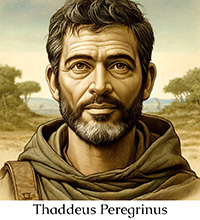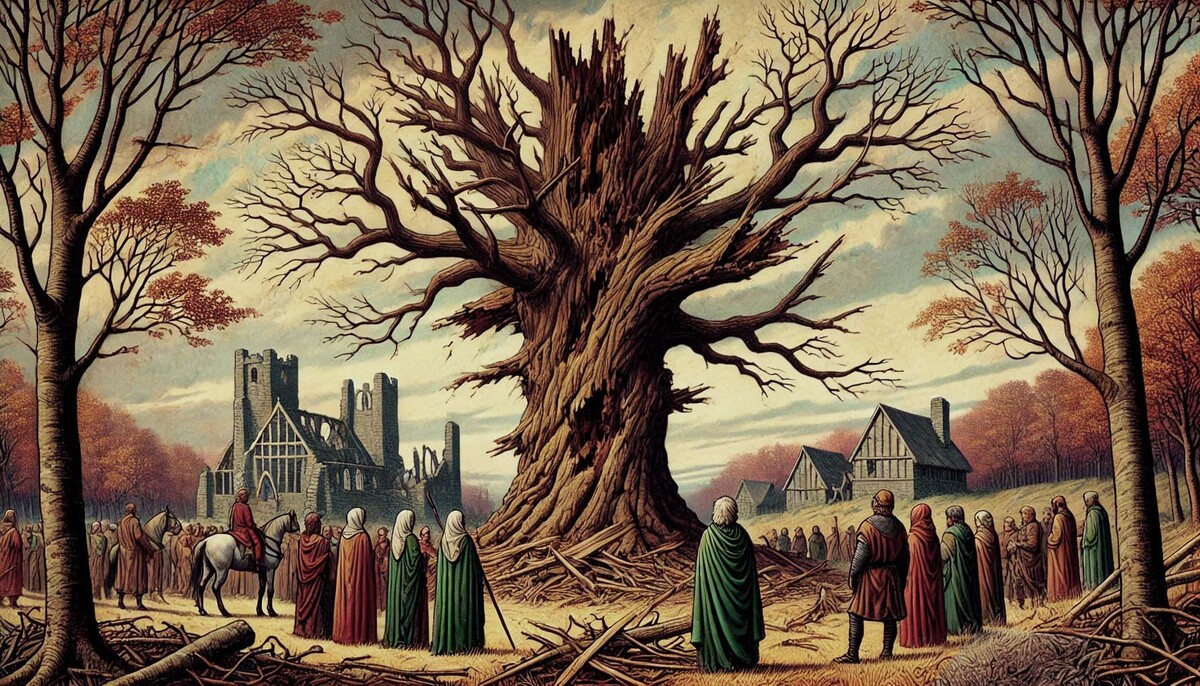There comes a time in every traveler’s life when the road ahead is hidden in fog, and each step presses into the ground with the weight of undreamt dreams. When the familiar warmth of sunlight gives way to the clammy, wispy shadows that float between us and the answers that elude us. It’s in these moments, when certainty turns out to be swampy ground beneath our feet, that the path feels most unsteady. I’ve walked many such roads in my years as a wandering scholar, chasing burning questions that seemed tangible enough, but often ended up evaporating like smoke. Though I’ve traveled the world in search of wisdom, I’ve found that true understanding slips from the grasp as easily as the mist I so often find myself walking through.
One day I found myself in a small village nestled between two hills, where the land exhaled a kind of silence that settles over those who’ve known loss. The fields, usually green with life, appeared muted, as if nature itself had retreated from its usual vibrancy. The stone homes, nestled into the earth, seemed weathered by more than just time — there was a heaviness in the air. The people, though generous, were subdued, offering bread and shelter with hands that trembled slightly, as though everything weighed a little more than it should. Beneath their warmth was a silence, one I recognized all too well. It was the kind of quiet that clung to them like damp clothes after a heavy fog — the same fog that has, more than once, enveloped my heart on this long and winding journey.
It wasn’t long before I understood the source of their sorrow.
The village had just lost their darling boy — a child full of life and promise, his laughter once echoing like birdsong through the narrow streets. He had been taken by an illness as sudden as a summer storm, leaving behind the kind of emptiness that no words could fill. His absence lingered like a heavy fog, touching everything and everyone. But it weighed especially on his father, Eirik, whose grief seemed as rooted as the ancient trees that lined the village, silent and unmoving.
I had noticed Eirik before we spoke. He moved through the village like a shadow, always keeping to the edges, avoiding eye contact, his broad shoulders hunched beneath a burden only visible to the heart’s eye. The villagers spoke of him in hushed tones, not out of fear or disrespect, but with the kind of reverence reserved for someone who had touched the depths of grief and returned with only fragments of themselves.
One evening, as dusk deepened and the air grew colder, I found Eirik sitting by a small fire outside his cottage. His home was tucked at the edge of the village, half-hidden by a line of trees that stretched up toward the hills. The flames flickered weakly, casting long, unsteady shadows over his face. The warmth of the fire barely touched the chill in the air. His calloused hands, heavy and idle, rested in his lap, and though he stared into the embers, his gaze was far beyond the flame, lost somewhere unreachable.
For a moment, I hesitated. Grief is a solitary thing, and I wasn’t sure my presence would be welcome. But something about the stillness in Eirik’s posture — the way he sat so still, like a man waiting for something that would never come — drew me closer. I sat down a little ways from the fire, the silence between us settling like a blanket over the night.
After long, timeless silence, Eirik’s voice broke the stillness. It was barely a whisper, a thread stretched too thin.
“He was just a boy,” he said, his voice full of cracks that hadn’t yet healed. “So full of life. How does something so bright get taken so ruthlessly?”
The rawness of his question struck me deeply. I had whispered it myself into the night on more than one occasion. The loss I had felt wasn’t of a child, but of a hope — one I had carried with me for years, believing that knowledge alone could shield me from the world’s storms. I had thought that understanding would be enough for me to withstand the vicissitudes of Life. But no knowledge could protect me from the truth: some losses come like a tsunami, without explanation, without reason, and without answers.
And I learned that stories, more than explanations, sometimes offer better solace in such times. So I shared one with him.
“There is a valley I once passed through, not unlike this one,” I began, my voice low as the night settled deeper around us. “At the heart of that village stood a great tree, its branches wide and strong, its roots sunk deep into the earth. The people admired it for its strength, believing it would stand forever, weathering whatever storms came its way.”
Eirik leaned imperceptably closer.
“But one day, a storm swept through the valley, wild and unrelenting. When it passed, the villagers found the great tree had fallen, its massive trunk split open, its once-mighty branches strewn and shattered across the ground. They stood around it, bewildered, asking how something so strong could fall so suddenly.”
The fire crackled as I spoke, the flames dancing weakly, but the light they cast over Eirik’s face seemed a little gentler now, softer.
“They wanted a reason,” I continued, “an explanation that would make sense of the loss. But an elder among them, wise in years, said to them, ‘Not all things fall because they were weak, and not all storms come with lessons. Sometimes, the wind takes what it will, and we are left to gather what remains.’”
Eirik let out a breath, slow and trembling, as if releasing something he had been holding too tightly for too long. His shoulders, broad and hunched, seemed to soften ever so slightly. For a moment, the crackling of the fire was the only sound between us.
“But that was a tree,” he said after a long pause, his voice hoarse with grief. “This was my son.”
“I know,” I said softly, feeling the weight of his sorrow pressing against my own chest. “It’s not the same. The story isn’t meant to compare the two. It’s meant to remind us that sometimes, no reason will ever be enough. We search for meaning, hoping that it will ease the pain, but some storms leave us without answers. What matters is how we choose to live after the storm has passed — how we walk among the broken pieces, and choose what to carry with us.”
Eirik’s eyes stayed fixed on the fire, but the flames reflected in them seemed less wounded now, steadier, as if the storm within him had calmed, maybe just a little.
“I don’t know if I can carry on,” he whispered, his voice barely audible.
“You don’t have to move forward all at once,” I said. “Grief has its own pace. And in time, there will be small steps — small choices that help you move forward. Perhaps tending the garden where your son once played, or spending time with those who are still here. You don’t need to understand the storm to begin living again. You just need to take little steps, however small.”
The fire crackled, and the night deepened, wrapping us both in its heavy silence. I didn’t expect my words to heal him — no words could — but I hoped they planted something, a small seed of comfort that might one day grow.
In the days that followed, I saw Eirik tending to the garden once more. It was a small space, tucked behind his home, where his son had often played, helping him plant seeds or pull weeds. Now, Eirik worked the soil with slow, deliberate hands, as if each motion was a way of remembering, of keeping his son’s memory alive in the earth itself. The garden bloomed again, quietly, as life always does. And though the ache in his heart remained, he had found a way to carry it, like a wound that had healed, leaving the scar of something precious that had been lost.
When I left the village, I did so with a quiet understanding. Not all storms come to test us, and not every loss has a reason we can grasp. Sometimes the fog lingers, and the road remains uncertain. But even in the darkness, we can still choose to keep walking, step by step, until the path once becomes clear and the sun shines on our path once again.
— Thaddeus Peregrinus

Thaddeus Peregrinus, a wandering scholar whose journey through distant lands has spanned both time and legend, has spent a lifetime seeking wisdom in the forgotten corners of the world. Although learned in philosophy, ancient texts, and the mysteries of the natural world, Thaddeus has found that true understanding comes not from answers, but from leaning into the unfathomable Mystery of Life. Thaddeus is currently a “Wanderer in Residence” at GrailHeart.
![]()
Thank you for reading GrailHeart!
Your thoughts and suggestions are always welcome—I personally respond to all sincere messages. (Spam is summarily banished to the outer darkness!) You can reach me through my contact form.
This story was penned under the pseudonym Thaddeus Peregrinus, a voice in the GrailHeart creative quest. If you’d like to connect with me directly, please feel free to reach out via the contact form above.
Looking for inspiration or unique gifts? Explore the fine wares at the GrailHeart Shoppe—your support means the world.
May you find serenity in your journey, courage in your challenges, and wisdom in your heart.
(This article originally appeared on SubStack.)



Leave a Reply